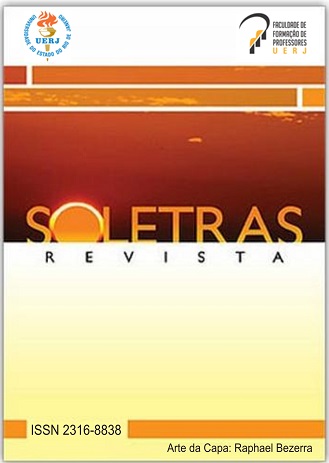Found footage and the gothic conventions
DOI:
https://doi.org/10.12957/soletras.2014.11121Keywords:
Literatura gótica, reivindicação da veracidade, filmes de horror, found footageAbstract
Social, historical, political and economic changes somehow are invariably reflected in the cultural and artistic manifestations of their time. In Gothic literature this is noticeable in elements such as medieval settings when they were more frequent (The Castle of Otranto), or the questionings regarding the creationist thought suggested in Frankenstein, materialized in The Origin of Species and revisited in The Strange Case of Dr. Jekyll and Mr. Hyde and Dracula, works that also display the technicism and scientific advancements in the second phase of the Industrial Revolution. Nonetheless, one recurrent element in the literary Gothic convention regardless of its time is the claims to truthfulness, understood here as an effort to convince the reader/viewer that the story told indeed happened, as incredible as it seems. Therefore, this article verifies the ways in which the claims to truthfulness appear in found footage movies, observing how the classical Gothic characteristics are replicated or subverted in this subgenre of horror movies. The conclusion points out that convincing the reader/viewer that the story is real still is a priority in the Gothic agenda. The theoretical support comes from texts present in seminal companions to the Gothic (Hogle, 2002; Punter, 2006; Botting, 2004), from Jenkins (2009), through the notion of convergence culture, from Baudrillard (2002), through the notion of the three postmodern phantasies, and from Aufdenheide (2007), through the concept of claims to truthfulness.Downloads
Published
Issue
Section
License
The approval of the article implies the immediate and free transfer of the publication rights in this journal. The author (s) authorize the Postgraduate Program in Literature and Linguistics (PPLIN) to reproduce it and publish it in Revista SOLETRAS, understanding the terms "reproduction" and "publication" in accordance with Definition of article 5 of Law 9610/98. The author (s) will continue to own the copyright for subsequent publications. The article can be accessed by the world wide web (http://www.e-publicacoes.uerj.br/index.php/soletras), being allowed, free of charge, the consultation and the reproduction of copy of the article for own use. Cases of plagiarism or any illegalities in the submitted texts are the sole responsibility of their authors.



